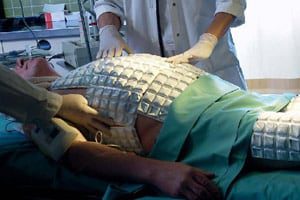
Heater-cooler systems, medical devices used to heat or cool a patient’s blood during heart surgery, have been linked to potential bacterial infections. WellSpan York Hospital in Pennsylvania recently warned 1,300 patients that they may have been exposed to a bacterial strain known as nontuberculous mycobacterium while undergoing open-heart surgeries between October 1, 2011 and July […]

Cardiac Surgery Device Linked to Infections
Heater-cooler systems, medical devices used to heat or cool a patient’s blood during heart surgery, have been linked to potential bacterial infections. WellSpan York Hospital in Pennsylvania recently warned 1,300 patients that they may have been exposed to a bacterial strain known as nontuberculous mycobacterium while undergoing open-heart surgeries between October 1, 2011 and July 24, 2015. Heater-cooler systems have been linked to infections in eight people at the hospital. Four of these patients have died; the hospital said the deaths were linked to the infection, but noted that other medical issues may have also contributed.
York Hospital is working with the Pennsylvania Department of Health and the CDC to manage questions from healthcare professionals and affected patients. A website has also been created for this purpose.
The U.S. Food and Drug Administration (FDA) addressed the situation in an October 15th safety communication. The agency received 32 reports of infections linked to heater-cooler systems thus far. “We are aware that the use of heater-cooler devices has been associated with Nontuberculous Mycobacteria (NTM) infections, primarily in patients undergoing cardiothoracic surgical procedure,” the FDA stated. “NTM organisms are widespread in nature and can be found in soil and water, including tap water sources. They are typically not harmful, but in rare cases may cause infections in very ill patients and/or in individuals with compromised immune systems.”
In July, Clinical Infectious Diseases published a report highlighting the potential for bacterial contamination associated with the devices. That same month, the FDA designated a heater-cooler system recall as Class 2. The reason for the recall was due to “otential colonization of organisms, including Mycobacteria […] if proper disinfection and maintenance is not performed per Instructions for Use.”
Hal Baker, MD is lead of infection control at York Hospital. In an interview with the New York Times, he acknowledged that the hospital had not been following 2010 cleaning instructions “to the letter,” The hospital says that less than 1 percent of patients undergoing the heart surgery were infected. Since symptoms can take months to manifest and the bacterial strain is slow to reproduce, tracking the problem proved difficult.
This is not the only medical device infection case to receive media attention recently. Earlier this year, duodenoscopes came under scrutiny after they were linked to superbug infections in several US hospitals.


